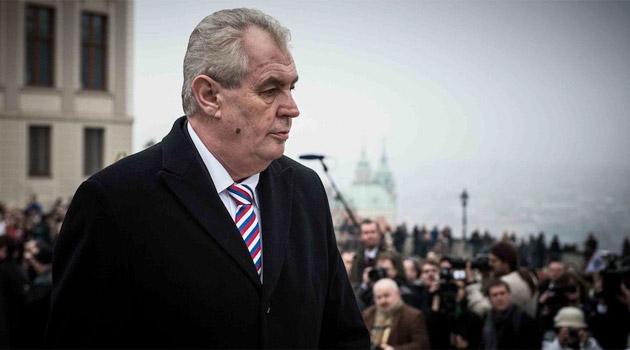One of the biggest sins of the pre-1989 regime was its conceptual confusion, its twisting of words to mean something other than what they originally stood for, and its emptying what was said of all meaning. The word "peace", for example, actually meant the Cold War, while the nickname of "People’s Democracy" meant the dictatorship of the proletariat.
During that regime, human rights violations were justified by the aim of building a brilliant future. We encounter similar verbal loops and turns of phrase today as well, even though they are not as massive, propagandistic, or quotidian as those of the "normalization" era.
Czech President Miloš Zeman is one of the leading producers of such slogans – he positively revels in them. Zeman has communicated the opinion more than once that the Czech Republic should not endanger exports and investments by Czech firms abroad (for example, in Iran or Uzbekistan) through an overemphasis on human rights protections.
He was referring at the time to the scandal around a scheduled visit by the Uzbek dictator, President Karimov, who had been invited to the Czech Republic by his predecessor, Václav Klaus. Many NGOs protested that visit.
Karimov ultimately postponed his travel to the Czech Republic. Nevertheless, we now have yet another head of state here for whom the free market matters more than anything else.
Once again it is being proved that the difference between Klaus and Zeman lies in their ideas about how to address the economic situation, not in their priorities. Both economists believe the "smooth running of the markets" trumps human rights.
That means nothing should prevent us from developing trade with, for example, totalitarian North Korea, as that country, thanks to the slave labor of its subjects, can supply goods very cheaply and we would all make a ton of money. No one consuming North Korean products is obliged to think of the poor people dying of exhaustion or as a result of torture in the concentration camps there.
During the presidential campaign, Karel Schwarzenberg recommended Zeman spend a month in prison in Iran or Uzbekistan so he could have some idea what he was talking about. "Once we resign ourselves to that priority we won’t have anything – no prestige, no pro-export activities, just the servility of President Zeman toward the dictators he admires. That’s not a value we’re going to be able to sell," said former Czech Finance Minister Miroslav Kalousek.
While this is true, it’s a shame these two boys from TOP 09 were so strenuously silent when the same thing Zeman is saying today was said by Czech PM Petr Nečas – and they were ministers in his government. The current ministers, however, have taken a very good approach to this issue.
Czech PM Bohuslav Sobotka has said that human rights protections can be combined with support for exports: "Our choice is not exports or human rights, after all. We must do our best for both," he said.
"Human rights protections and trade cannot be seen as mutually antagonistic values. Human rights are universal. It is not possible to perceive the value of human dignity and human life differently depending on geography," said Human Rights Minister Jiří Dienstbier when asked to comment on Zeman’s statements.
War supports the market
Zeman did not invent the false impression that, after the fall of the Iron Curtain and the alleged end of the Cold War, we wouldn’t have to worry about human rights from the point of view of international affairs, but nevertheless it is unfortunately he who so lightheartedly makes statements that result in making people’s situations worse – and sometimes our trade opportunities as well. Zeman also says one of his priorities is that Russia should not be subjected to any economic or trade sanctions, but that the Ukrainian crisis should instead be addressed through saber-rattling.
Zeman proposes frightening Russia through a display of force. Let’s ignore, for the time being, the naivité of his conviction that Russia can in fact be frightened, and let’s just say that Zemans’ proposal, "with a little luck", is aiming for an ideal market and an ideal degree of trade in which everyone who participates is guaranteed a profit.
In this scenario, the factories of Russia and the West, mutually flexing their muscles, would lead to increased profits in the arms market. This demand would spark a need to capitalize on the results of this trade in practice, as we all need constant economic growth.
If an armed conflict or possibly even a regional war were to occur, it could always grow into a conflict of larger dimensions. Everyone would continue to trade with Russia and supply them with everything they need, including arms.
This mechanism was already beautifully described by Karel Čapek in his novel War with the Newts. Remember?
Babbling
Babbling is probably part of human nature, but we should always be alarmed when a politician or social leader does it, to saying nothing of a President. The Polish philosopher and political scientist Józef Maria Bocheński, in his Dictionary of Philosophical Superstitions, defines babble / babbling as follows: "Human speech that makes no sense. Babbling in and of itself is not a superstition, but the conviction that by babbling one can convey information about objective matters is a superstition."
During his entire political career, Zeman has had a tendency to greatly simplify matters, as displayed by the fact that he prefers witticisms to analysis. It is well and good when commentators or other highly-placed politicians remind him of that fact from time to time.
